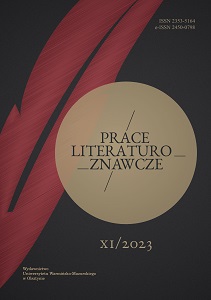A displaced person’s settling of accounts: the grotesque image of the post-war order in the poetry of Tadeusz Borowski
A displaced person’s settling of accounts: the grotesque image of the post-war order in the poetry of Tadeusz Borowski
Author(s): Sławomir SobierajSubject(s): Polish Literature, Post-War period (1950 - 1989), Theory of Literature, Sociology of Literature
Published by: Wydawnictwo Uniwersytetu Warmińsko-Mazurskiego w Olsztynie
Keywords: World War II; DP camps; Polish poetry; Tadeusz Borowski; grotesque;
Summary/Abstract: The main thesis in the introductory part of the article argues that Tadeusz Borowski’s poems, written from the perspective of a DP camp inmate, involve the claim and show the image of reality after World War II in a grotesque way. The analysis of the selected poems of the post-war order grotesque covers three central issues: the personal feelings of a displaced person whose right to freedom has been taken away in a supposedly free world, the national concerns of Poles and the political situation after 1945. Borowski is shown as the creator of modern poetry, dominated by the grotesque, and he needs it in order to get to the hidden or concealed truth. The grotesque effect is achieved by using heterogeneity of the style, mixing a journalistic style and colloquial and vulgar expressions with highly sophisticated metaphors, mundane matters combined with national symbols and myths, and biologism opposing ideology. Moreover, the effect usually occurs in combination with the poetics of surprise and antinomy, supplemented with sarcasm and parody or absurdity. The grotesque serves as a supplement to realism and documentarism.
Journal: Prace Literaturoznawcze
- Issue Year: 2023
- Issue No: 11
- Page Range: 51-67
- Page Count: 17
- Language: English

